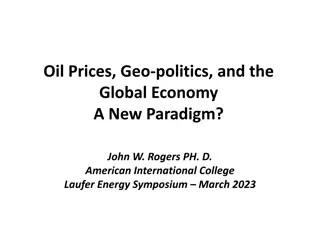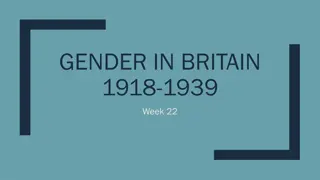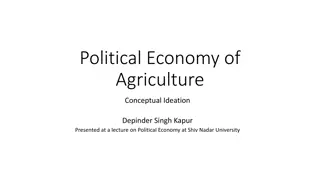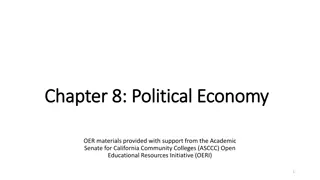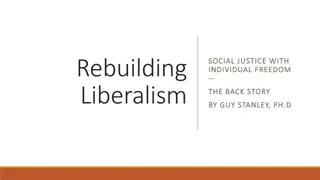Understanding the Interplay of Economy, Politics, and Society
Exploring the connections between politics, economy, and society, this lecture delves into the influence of economic systems like capitalism and socialism on political structures. It discusses how economic conditions shape politics and social divisions, emphasizing the intertwined nature of these aspects in modern societies. Key questions on government control of the economy, economic cleavages, and the impact of class, race, and gender on political life are also examined.
Download Presentation

Please find below an Image/Link to download the presentation.
The content on the website is provided AS IS for your information and personal use only. It may not be sold, licensed, or shared on other websites without obtaining consent from the author. Download presentation by click this link. If you encounter any issues during the download, it is possible that the publisher has removed the file from their server.
E N D
Presentation Transcript
The The Economy Economy and and Society Society Lecture 7
Relationships Relationships between betweenpolitics society society politics, , economy economy and and Two main economic philosophies: capitalism and socialism Party programmes and voting behaviour shaped by social divisions Economy often decides about election results Marxist view politics a reflection of the class system Base (economy) conditions politics ( superstructure ) However, politics understandable only within and economic and social context Politics intertwinted with economy and society
Central Central issues issues to be to be examined examined How, and to what extent , does the economy condition politics? What are the major economic systems in the world today? What are their strengths and weaknesses? How far can, and should government control the economy? What are the key economic and social cleavages in modern societies? To what extent do class, race and gender structure political life?
Economic Economic systems systems An economic system a form of organization goods and services are produced, distributed and exchanged Capitalist economy features Commodity (good or service) production for exchange it has a market value Productive wealth (the means of production ) in private hands Economic life organized according to market principles (demand and supply) Material self-interest and profit maximization provide the motivation for enterprise and hard work (through competition)
Market Market Market a system of commercial exchange that brings buyers into contact with sellers (it is an impersonal mechanism regulated by price fluctuations reflecting the balance of supply and demand market forces) Money a convenient means of exchange rather than barter Advantages of market Promotes efficiency through the discipline of profit motive Encourages innovation new products and better production processes
Market Market advantages advantages Promotes efficiency through the discipline of profit motive Encourages innovation new products and better production processes Producers and consumers pursue their own interests and enjoy freedom of choice Equilibrium through the coordination of individual preferences and decisions
Market Market - - disadvantages disadvantages It generates insecurity through forces people cannot control - It widens material inequality and generates poverty It increaces the level of grees and selfishness and neglects the broader needs of society It promotes instability periodic booms and slupms However there is no uniform model of market capitalism Countries construct their models of capitalism different economic and political circumstances and historical, cultural heritage
Socialist Socialist economy economy - - principles principles System of production geared (at least in theory) to the satisfaction of human needs Predominantly public or common ownership of productive wealth Economic organization based on planning Rational process of resource allocation Work based on cooperative effort for general well-being State socialism (Soviet bloc) collapsed in 1989-1991 It undermined the belief an ideal socialist system exists State socialism the state controls and directs economic life in the interes of the people (in fact in the interest of party and bureaucracy)
Enterprise Enterprise capitalism capitalism Many capitalisms in the world Feudalism agrarian-based production; fixed social hierarchies and a rigid pattern of obligations and duties Capitalism relied on the market mechanism technological innovation and greater productive capacity Enterprise capitalism a pure capitalism (the Anglo-American world) based on the ideas of Adam Smith, David Ricardo, Milton Friedman and Friedrich von Hayek Market self-regulating mechanism (an invisible hand ) Adam Smith: It is not from the benevolence of the butcher, the brewer, or the baker that we expect our dinner but from their regard to their own interest Profit orientated high productivity, labour flexibility low welfare benefits USA economic super-power due to enterprise capitalism principles Disadvantages huge material inequalities, social fragmentation, social tensions
Social Social capitalism capitalism Social market economy born in Germany Market economy but supplemented by welfare system and effective public services a means of generating wealth for social needs Economy supports social cohesion and solidarity Regional banks invest in business corporations long term profits Social partnership, cooperation and subsidiarity businesses, trade unions and politicians Comprehensive and well-funded welfare provisions protect workers Germany economic miracle after WWII the leading economy in Europe but quite inflexible and costly Social capitalism contradiction?
Collective Collective capitalism capitalism The model based on the example Japan after 1945 Followed by other East Asian tigers (South Korea, Taiwan, Singapore, China) Cooperative long-term relationships Economy to be directed by relational markets 40% of capital of the Tokyo stock exchange owned by industrial groups (sister firms); 30% - networks of cross-shareholdings binding industrial concerns with thier subcontractors stability and abundance of capital - long-term investment Workers life-time employment, pensions, social protection Teamwork and collective identity crucial State guides investment, research and trading decisions plans ahead But workers are exploited; work long hours; work dominant; authoritarian atmosphere
The The state and state and the the market market Keynesianism economic strategy invented by John M. Keynes Rejected lassez-faire principles (the principle o nonintervention of government in economic affaires) Inctroduced the policy of demand management realized by most Western governments after WWII by tax and spending policies Monetarism emerged in reaction to stagflation (unemployment and inflation of the 1970-ies) and constant printing money Promoted sound money through controlled inflation Left economic growth, employment and productivity to the self-regulating market The UK and USA in the 1980-ies followed this path with success but monetarism is nowadays combined with active economic policies of governments realizing also social capital is needed (in the form of trust).
Varieties Varieties of of socialism socialism Humanizing capitalism by Keynesian or social-market ideas Socialism as an alternative to capitalism - created as a totally different economic system State socialism created in Russia after the Bolshevik Revolution (Lenin s War Communism and New Economic Policy; then Stalin s second revolution of the 1930-ies) Collectivization, nationalization, centralization state control of ownership and economic processes total inefficiency and bankrupcy Market socialism socialism united with market competition (also failed) Its self-management was not efficient lacked market discipline Economic third way e. g. Sweden left-wing version of social capitalism Environmental theorists critical of both socialism and capitalism rejected economic growth obsession Propose focusing on sustainability of the natural environment ownership and organization of wealth of secondary importance ecology before economics and morality before materialism ( buddhist economics E. F. Schumacher)
Society Society and and social social divisions divisions Society not only the context but rather the stuff substance of politics all political life takes place within society; it influences politics considerably Society groups with a social structure, awarness and cooperation Social class people of the same economic and social status Marxist view the possesing class and exploited class In XXIth century irrelevant the end of class politics (middle class and underclass the excluded , dependant , deprived ). Racial, ethnic divisions blacks, Jews, Arabs discriminated their struggle in 2nd half of XXth c. Radical feminists find gender divisions the most important social cleavages traditional societies patriarchal -dominated by men sexual revolution needed to transform cultural relationships and socio-political structures
Recapitulation Recapitulation Economics influences politics at almost every level. Capitalism focused on general commodity production, profit maximization, private ownership of wealth and the market organization of economic life. Socialism public or common ownership; economic planning; satisfaction of human needs Both systems have never been pure or classical in practice Economic systems may be regulated or left untouched (pros and cons) Society and its structures influence politics Class, race and gender divisions most politically significant of the social divisions in modern society; race and gender more important than class


